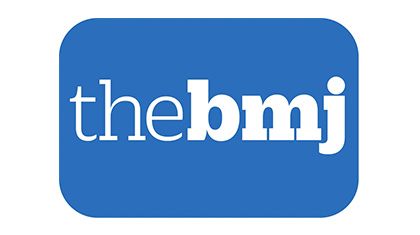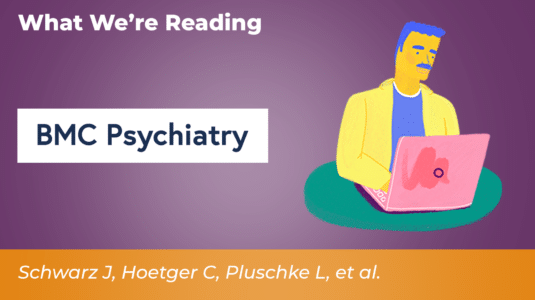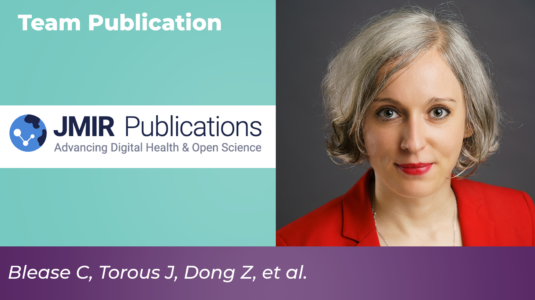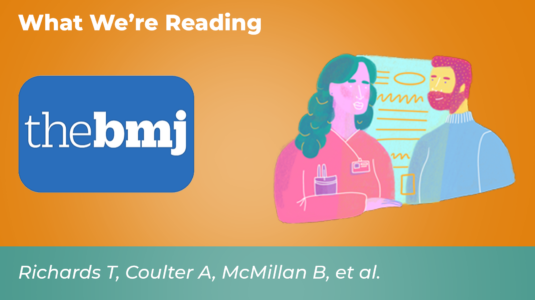Despite initial professional resistance and policy delays, countries like Denmark, Estonia, Sweden, and the US have demonstrated that the benefits of full record access outweigh the risks. Patients globally are calling for interactive, user-friendly portals to access and correct their medical records, emphasizing that this is crucial for self-care, particularly in the post-pandemic era where healthcare access has declined.
International Perspectives
Psychiatrists’ perceptions of conditions and consequences associated with the implementation of open notes: Qualitative investigation
Psychiatrists practiced in Germany where open notes have not yet been established as part of the healthcare data infrastructure. Open notes were perceived to increase transparency and patient involvement but were also believed to raise issues of stigmatization and conflicts.
Patient online record access in English primary care: Qualitative survey study of general practitioners’ views
This study provides timely information on the views of GPs in England regarding patient access to their web-based health records. Overwhelmingly, GPs were skeptical about the benefits of access both for patients and to their practices.
Patient access to full general practice health records
Researchers in the UK say patients have little choice but to be more self-reliant due to overwhelming demands on the health system. Ready online access to full health records could help and may also reduce demand.
Anticipated Benefits and Concerns of Sharing Hospital Outpatient Visit Notes With Patients (Open Notes) in Dutch Hospitals: Mixed Methods Study
Dutch patients are interested in shared visit notes, but physicians have many concerns that should be addressed if shared notes are pursued. Physicians’ concerns should be addressed before shared notes are implemented. In hospitals where shared notes are implemented, the effects should be monitored (objectively, if possible) to determine whether the concerns raised by our participants have actualized into problems and whether the anticipated benefits are being realized.
Open Notes Become Law: A Challenge for Mental Health Practice
Although benefits to patients’ having access to psychiatric notes have been documented, early studies involved patients’ access to hard copies they often reviewed in the presence of mental health professionals. … Clinicians worry about possible harms, and in surveys, many psychiatrists anticipate that patients will become confused, get angry, or decompensate when reading their notes. However, experience challenges the assumption that mental health notes should remain segregated because these patients “cannot handle it.” … Both anecdotally and in surveys, fears among clinicians have largely been unrealized, and we are not aware of any reports of harm to or legal action from patients accessing their mental health notes.
Preparing Patients and Clinicians for Open Notes in Mental Health: Qualitative Inquiry of International Experts
This study provides timely information on policy and training recommendations derived from a wide range of international experts on how to prepare clinicians and patients for open notes in mental health. The results of this study point to the need for further refinement of exemption policies in relation to sharing mental health notes, guidance for patients, and curricular changes for students and clinicians as well as improvements aimed at enhancing patient and clinician-friendly portal design.
Tobias Esch: Integrating OpenNotes and promoting self-management in primary care in Germany: The Witten Model
In Germany, patients’ rights to access their health information has been enshrined in the Civil Code since February 2013. The right to “inspect medical records” in § 630 g states “The patient is on request to be permitted to inspect the complete medical records concerning him/her without delay to the extent that there are no considerable therapeutic grounds or third party rights at stake to warrant objections to inspection. The patient can also request electronic duplicates of the medical records.”
U.S. policy requires immediate release of records to patients: Patients and clinicians should embrace the opportunities
On 5 April a new federal rule will require US healthcare providers to give patients access to all the health information in their electronic medical records without charge. This new information sharing rule from the 21st Century Cures Act of 2016 mandates rapid, full access to test results, medication lists, referral information, and clinical notes in electronic formats, on request. The US is not alone in providing patients with full online access to their electronic health records. In Sweden, patients gained access to their records between 2012 and 2018. Estonian citizens have had full access since 2005. The sharing of personal health information isn’t without precedent in the US: around 55 million people already have access to their online clinical notes, and many more have access to laboratory results and other parts of their records. But for some US clinicians, the new rule may feel like a shock.
Mobile Access and Adoption of the Swedish National Patient Portal
Patient portals are used as a means to facilitate communication, performing administrative tasks, or accessing one’s health record. In a retrospective analysis of real-world data from the Swedish National Patient Portal 1177.se, we describe the rate of adoption over time, as well as how patterns of device usage have changed over time. In Jan 2013, 53% of all visits were made from a computer, and 38% from a mobile phone. By June 2020, 77% of all visits were made from a mobile phone and only 20% from a computer. These results underline the importance of designing responsive patient portals that allow patients to use any device without losing functionality or usability.







